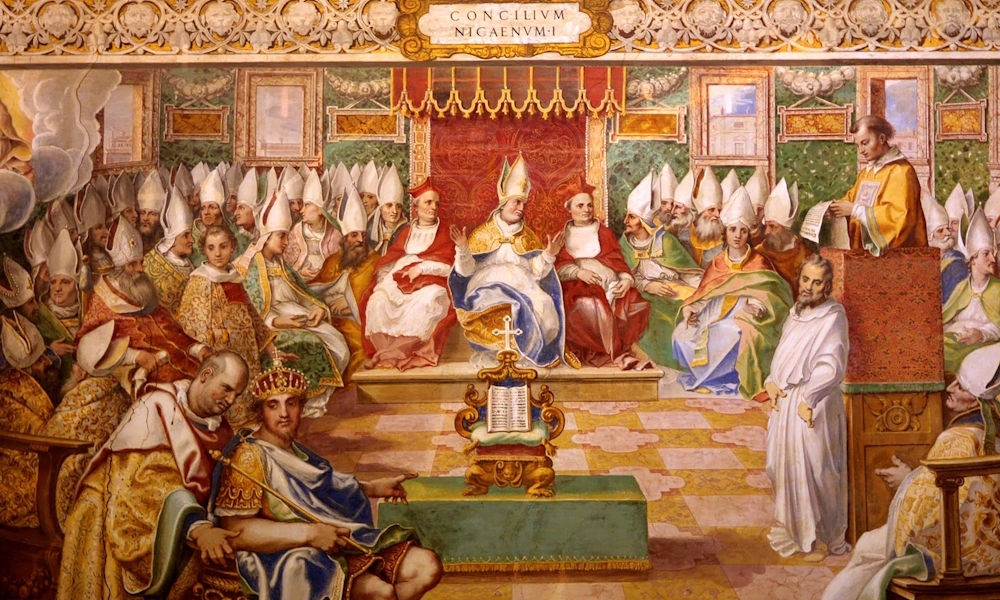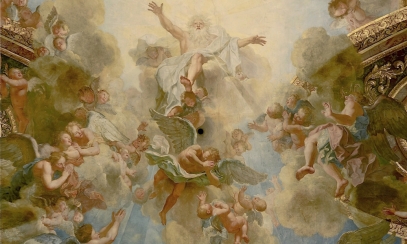
The Nicene Creed
Part One
Part One
Amazingly, this year marks the 1,700th anniversary of the Council of Nicaea, which the Vatican will acknowledge with events Sept. 12-13.
Amazingly, this year marks the 1,700th anniversary of the Council of Nicaea, which the Vatican will acknowledge with events Sept. 12-13.
The council, which was called by Constantine, emperor of the Roman Empire, in the year 325, summoned bishops and their representatives to join him at what would be the first, and what some consider to be the most famous, general council in the history of the Christian Church. What followed was a two-month debate that was sometimes angry and bitter, as those present attempted to settle the “Arian Controversy.” For those wondering, the controversy arose from the teaching of an elderly priest named Arius, from Alexandria, Egypt. He preached that Christ was not God;[i] rather, he purported Jesus was like all human beings, subordinate to the Father.[ii]
Richard McBrien, in his series of books titled Catholicism, describes the dilemma this way: “At stake was the very practical matter of our salvation in Christ, to which the Sacred Scriptures clearly attest. If the Son is not God, wholly situated within the Godhead on an equal footing with the Father, then He is not our Savior, and we are not saved. For if the Son is a creature like us, He has no special standing before the Creator against Whom we creatures have sinned. His act of reparation on our behalf has no ultimate effect.”[iii]
For obvious reasons, the “controversy” needed to be settled. What came out of the Council of Nicaea was the basis for what we call today the Nicene Creed. Further refinements to the creed were made in 381 at the Second Ecumenical Council held in Constantinople, which presented the definitive creed of the Catholic Church, proclaiming the Church to be one, holy, catholic, and apostolic.[iv] Several centuries later, the Western Church added the Latin “filioque” to the third article of the creed[v] not only to assert the divinity and humanity of Christ, but also to include the role of the Holy Spirit, which reinforced belief in the Trinity.[vi]
Undoubtedly, if you are a cradle Catholic, you have recited this creed since you were able to either memorize it or read it from the Sunday Missal, but have you ever taken the time to really learn just what you were declaring? Yes, we know that this creed states the basic tenets of our faith, but do we fully understand the meaning of the statements that are being made? What about those unfamiliar expressions such as “Only begotten Son of God,” or “God from God, Light from Light, true God from true God,” not to mention “consubstantial with the Father”? Week after week, we say these words, but do we really understand them? Shouldn’t we? After all, we are standing before God and our fellow parishioners proclaiming that this is what “I believe”!
As we enter into the study of the creed, I remind you that this series is not intended to be an in-depth theological treatise. My goal, however, is to provide a basic understanding of what the Council Fathers of Nicaea and Constantinople wanted to convey and to encourage you to seek further levels of knowledge and enlightenment either through self-study or with your local pastor, parochial vicar, or deacon. If we read the creed with deeper insight, it will also have a direct effect on our spiritual lives and the way we approach our mission to serve God in this world.
In the next issue, we will dive into the creed, looking at the words, “I believe in one God, the Father almighty …”
[i] Coulombe, Charles, Vicars of Christ — A History of the Popes. New York, NY: Citadel Press, Kensington Publishing Corporation, 2003, p. 65
[ii] Whitehead, p. 312
[iii] McBrien, Richard P., Catholicism Vol I. Minneapolis, MN 1980, p. 292
[iv] Whitehead, p. 87
[v] Lennan, Richard, editor. An Introduction to Catholic Theology. New York/Mahwah, NJ: Paulist Press, 1998, p. 79
[vi] Strassburger, Father Brian, SJ, Catholic 101: What is the Creed?, www.thejesuitpost.org, July 1, 2020, in Catholic 101, Spirituality
Deacon Robert Long was ordained to the permanent diaconate Dec. 7, 2013, by Bishop Emeritus Robert Baker at the Cathedral of St. Paul. He is assigned to Our Lady of the Valley Catholic Parish in Birmingham with an apostolate of Biblical Studies. Excerpts from Deacon Long’s series on the Nicene Creed will be published in issues of the One Voice through the end of 2026. The following comprises the first installment of his 8-part series.


